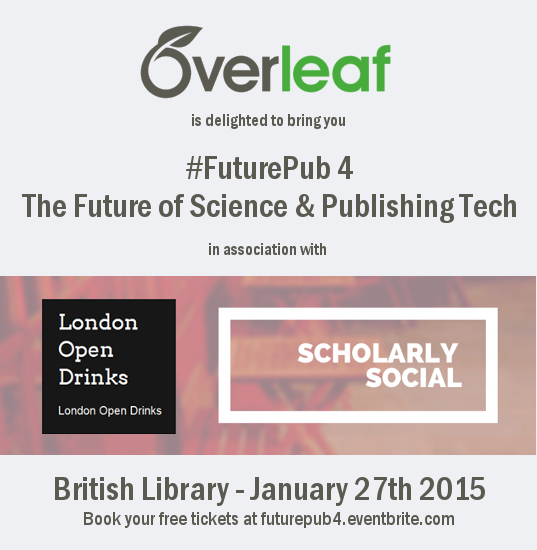Subscribe to our newsletter
Overleaf’s #FuturePub 4 with #ScholarlySocial and #LdnOpenDrinks
#FuturePub 4 on January 27th is joining forces again with Scholarly Social and London Open Drinks to bring you an evening packed full of science and publishing goodness at the British Library. A succession of quickfire talks will explore the latest developments in science and publishing technology to kick off discussions and conversations about what’s up and coming in 2015. Book your tickets now! If you’re unable to attend in person then you can still register to receive details of the live stream for the event (these will be sent shortly before the event starts on the 27th January).
Speakers
Ian Mulvany, Head of Technology for eLife
How to make the probably the best online article reading experience even better.
I will talk about our current iterations and future plans for eLife lens. eLife Lens is an innovative tool for viewing research articles on a screen. We have had great feedback in the tool, and we would like to get peoples reactions and thoughts on our current experiments with the tool.
Ian is head of technology for eLife, an open access publisher, and has previously worked on a number of tools for academics, including connotea and Mendeley.
Christopher Rabotin, back end developer at Sparrho
Sparrho: Our recent progress and next challenges
Sparrho is your recommendation engine for scientific information. Interactions like indicating your keywords and favourite articles in Sparrho teach us how to aggregate, distill and recommend content relevant to you – allowing you to keep a bird’s eye view on science. I’ll talk about our recent progress, and the next challenges we plan on tackling in 2015.
Chris holds a Masters degree cum laude in electronics and computer science from ESIEE Paris (Université Paris-Est). He has a passion for space engineering and before Sparrho he worked on satellite procedures for SES.
Kaveh Bazargan, founder of River Valley Technologies
How publishing can be better, faster, and cheaper
Despite the technological advances in recent decades, the basic model of scholarly publishing has remained the same, except that manuscripts and proofs are sent as email attachments, rather than by post. I will show how a fully browser based workflow can reduce cost, increase speed, and improve the quality of scholarly publications.
Kaveh Bazargan is a physicist by training, specializing in 3D imaging. In 1988 he founded River Valley Technologies in London, in order to introduce computer generated illustrations to UK publishers. The main business is now typesetting for STM publishers, using the only “pure” XML-first system in the industry. In recent years River Valley has been working on cloud-based platforms for publishers, including an end-to-end XML-based authoring to publication platform.
Keren Limor-Waisberg, creator of The Scientific Literacy Tool
Lowering the barriers to scientific knowledge
The Scientific Literacy Tool is an educational web-platform established to allow scientific literacy. Our goal is to help people interested in science – discover, understand, and explore scientific texts. I will talk about our background and goals as well as briefly introduce the first public version of the scientific Literacy Tool.
Keren holds a PhD in Biochemistry from the Weizmann Institute of Science in Israel. She leads and volunteers in different projects promoting collaboration between academia and society.
Winston Li, Ben Anuworakarn, Alex Lown, Alex Mousafeiris, Zain Sekha and Jit Yap, Imperial Student Team
Collaborate Online and Offline with Overleaf and Git (beta)
The six of us are Computing students at Imperial College London, all currently in the third year of our course. Part of our Winter Term this year consisted of a large group project involving building a product on our own, applying the various ideas and concepts we’ve learned so far, ranging from programming styles and problem solving, all the way to software engineering practices and design decisions.
This project added an offline mode to Overleaf through the popular version control system, Git. It was a surprisingly deep project that required the understanding of a lot of things that we normally take for granted, and all of us had to be on the same page to ensure a successful project.
If you want an idea of what to expect there is a recording of the #FuturePub 3 live-stream which you can watch below.
About Scholarly Social
Scholarly Social is an open and collaborative space to share ideas and make connections. We host social gatherings where you can share top tips and network with people involved in scholarly communication. You don’t represent your organisation, just your individual self, and everyone connected to scholarly communication is welcome, including publishers, librarians, researchers, consultants, intermediaries, and students.
If you can’t make this one, join the Scholarly Social LinkedIn group to be informed of future events, and if you have any questions you can find the organisers Bernie and Ginny on Twitter.
About London Open Drinks
London Open Drinks is a (very!) informal get together for anyone with professional or personal interests in Open Access, Open Data, Open Knowledge, and Open Anything Else. Previous events have attracted around 30 people, most of whom work in and around the sciences (including researchers, publishers, funders, journalists). We want to actively encourage interaction between interested parties who might not otherwise come into contact.
For information please visit our website, and follow us on Twitter for more details as the night approaches.
If you have any questions about London Open Drinks please direct them to the Wellcome Trust’s Adam Dinsmore at a.dinsmore@wellcome.ac.uk.




